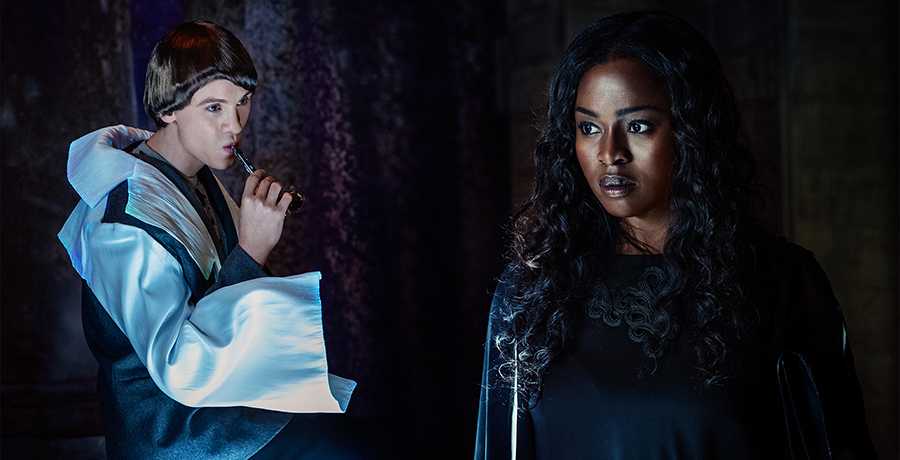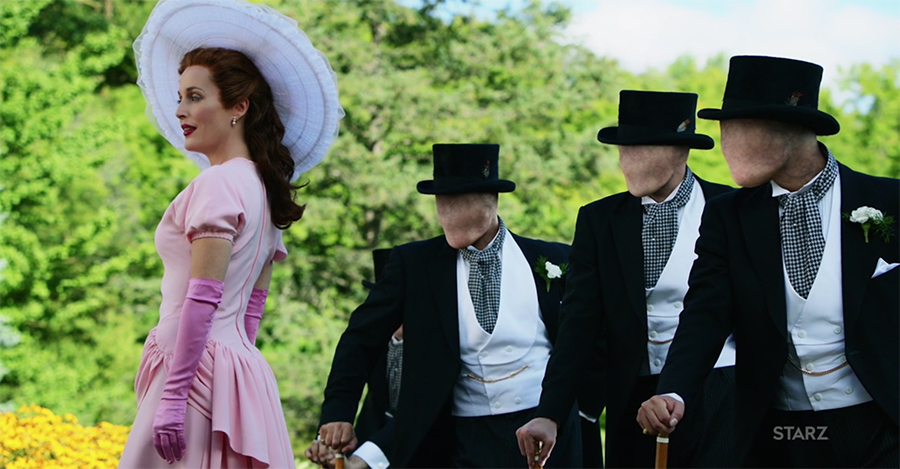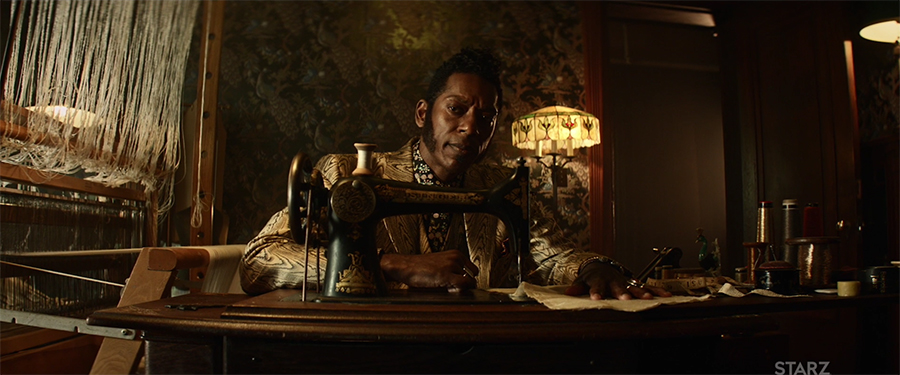First, let’s start off with the easy stuff. Shadow and Wednesday stop off at Anansi’s clothier—just as Vulcan showed his allegiance, false though it was, by crafting a sword, Anansi does it with bespoke suits. Anansi tells another story of Black pain in an unforgiving New World, but this one has a darker turn. Then, we’re off to Easter’s Easter party. Wednesday lays on the charm and smarm to hook in Easter; meanwhile, Shadow, a man who refuses to believe in what he sees, is confronted with a holy host of gods. The storm Wednesday seeded in the second episode with the dandelion fluff finally blows in and makes The Children a sacrifice to Easter. Shadow’s spiritual crisis comes to a head as Wednesday forces the belief right out of him. Mr. World and the new gods declare war.
Wednesday set up Laura’s death as a sacrifice and to maneuver Shadow into his grasp. Clearly, Shadow can’t be as insignificant as Mad Sweeney believes—Wednesday wouldn’t have gone through all that trouble and all those years of planning to snare some meaningless rando. It’s Shadow’s belief in particular that sets Wednesday, or should I say Odin, off. Apparently, sacrifice of life is like a bump of coke for a god. If Easter was powerful enough to steal Spring before, she likely would’ve tried it. But with death on her hands, she has enough short term power to work her magic…just as Wednesday planned.
Since the premiere, I’ve been saying that at the pace the season was going it looked like Wednesday and Shadow would reach the House on the Rock just in time for the final credits. Turns out I was half right. Not to veer too far into the novel, but moving Shadow’s “come to Jesus” moment to before the House on the Rock rather than during their time there changes the whole meaning of the visit. In the book, that’s where Wednesday makes his pitch to the other gods and where Shadow finally sees so much he has no choice but to believe. Instead, both of those things happen at Easter’s. Without those moments, the House on the Rock is little more than a meeting spot; most of the godly debate happens after they exit the attraction. As to what’s next, I’m in the dark as much as the newbies.

Women get a lot to do this week. The two oldest deities we’ve seen are Bilquis and Easter, while Wednesday represents the next group of gods who supplanted the first order, and Mr. World the newest replacements. This could be a hint toward the Venus figurines from the Paleolithic era. While we don’t know their true purpose, some of the theories claim these figures were part of fertility rites, representations of mother goddesses, or women looking down at their own bodies as models. Their prolonged existence also nods to women as survivors and the traditional association of goddesses to love, sexuality, birth, and life.
Death does not become Laura Moon. Temporarily losing the sun coin has hastened her decomposition. Laura cared so little in life yet cares so much in death. “Good, because as it turns out I really have a lot to live for and it’s so close I can feel it. It’s the only thing I can feel. So, I would really like to not be dead anymore so I can feel it fully.” This is the first time seeing Laura acting timid. She smiles and simpers, but it isn’t a scam. She’s genuine in her respect and honest about her intentions. Easter is Laura’s only chance at becoming the woman Shadow always thought she was. But she’s not so lucky, even with a leprechaun at her side. Because her death was orchestrated by Wednesday as a sacrifice, Easter can’t undo it. Yet another woman screwed over by a dude.

“They forced our queen into the backseat.” What a hellishly layered line. A Black god in America saying that sentence about a Black woman who yearns for the freedom to live her life free of the patriarchy. And as he says it, we see Bilquis consume a light-skinned man, a man who initially dismissed her and only took interest when she offered her body. Here’s where I have trouble with Bilquis’ “Coming to America” story. The whole multiple Jesuses thing establishes that there can be many versions of the same god, depending on the believer. Bilquis splits in two, one going to Los Angeles to become a homeless woman and the other staying near the Ba’ran temple in Ma’rib, Yemen, to eventually be destroyed by Daesh during their 2015 occupation. That means there should be at least two other Bilquises floating around—one tied to Judeo-Christian-Islam lore as the Queen of Sheba and the other associated with Sungbo’s Eredo near Ijebu Ode, Nigeria, where she’s known as Bilikisu Sungbo.
As for the LA Bilquis, I don’t buy her descent into ruin. Not at all. Here’s a woman who thrives on sexual conquest, and you’re telling me that she, a very attractive and sexually available woman, can’t get any? In Los Angeles, a town infamous for decadence and hedonism? Even without a cellphone she should be able to pick up half a dozen conquests in a single evening just by walking to a bar. If she cleans out their wallets after the fact like book Bilquis does, she should be well off. Instead, the goddess that could adapt to changing times over the course of a millennium somehow couldn’t handle the shift to the US? Wednesday, Anubis, Ibis, and Anansi all exist without their original believers, so Bilquis should’ve been able to transition just fine without the Yemeni woman who brought her over. While Americans don’t worship Bilquis, Easter demonstrates that any kind of belief, direct or indirect, will suffice. Wednesday is obsessed with prayer in his name, but that seems more to do with his ego than with the realities of godhood.
More importantly, American Gods has now taken this powerful, independent queen and put her fate into the hands of men. Specifically, white men—the new gods are white and two of the three are men. Bilquis’ story is one of female empowerment and survival in the face of man’s rage, yet when brought to the New World she flounders until a white man offers her aid. She shows no initiative, takes no actions, just slides into oblivion. She doesn’t pull herself up, she waits for a man to do it for her. I don’t believe it and I really don’t like it. This portrayal is the exact opposite of the Bilquis we met in Yemen, and undercuts the Bilquis from the second episode. This new wrinkle minimizes her self-determination and puts her salvation in the hands of men. They even decided how she should look! Now Bilquis is little more than a pawn in the battle between angry white men. She has no agency now.

Not only did the show force Bilquis under a white man’s heel, but it did it again with Easter. Easter is another ancient goddess who also lost her position as queen to men and a male-dominated religion. When men steal her sacred day, she doesn’t adapt for the modern age, but apparently waits for a white man, Mr. World, to do it. She doesn’t resist the new gods until another white man, Wednesday, flatters her.
She’s supposed to be this all-powerful mother goddess and instead she’s easily manipulated by a dude and another dude’s spokeswoman. Easter has to be wholly ignorant of American spirituality if she really believes Wednesday when he says humans will pray to Ostara for their harvests. If anything, her actions will benefit the Jesuses, not her. We don’t live in an atheist world, and no amount of Media interference could erase the very Christian principles on which our nation was founded. Easter says she’s no fool, but buying Wednesday and Media’s hogwash is downright foolish.
There’s also something to be said about a show where a Black woman is allowed to live only by the grace of a white man while a white woman is allowed to not only thrive by submitting to white men but is also able to rebel and claim independence (all while being supported by a male ally). Bilquis is largely silent, whereas the other gods can barely shut up. It’s also pretty hinky watching a white woman treat a Black man as an object of her desire. Easter female-gazes all over Shadow and treats him not like a man or a human but as a thing that pleases her. That’s white feminism to a T.
So far, Wednesday has only sought alliances with men or white women. Yet the show doesn’t seem to notice the larger context surrounding Easter or Bilquis’ evolution, or consider how it looks to have a white woman get all “jungle fever” on a Black man. Or if it does, the series isn’t interested in exploring that context. I’ve said it before, but this is a show that really needs a diverse writers’ room if it wants to adequately tackle these topics. The white male perspective is all over American Gods, and when it comes to portraying racism and misogyny, that fact is much to its detriment. The show has a lot to say about the myriad elements of the American experience, but it lacks the contextual nuance to bring home the point.

Despite its many complicated problems, American Gods is still a tremendous show. It’s a gorgeous heartbreaker and a visceral escape. Every tiny little production detail is exquisite, and the acting superb. The changes from page to screen haven’t always worked, but I admire that they took the chance and tried to build something new. Even when it annoys the hell out of me, I love it. American Gods has made me a believer. See you for Season Two!
Final Thoughts
- Reminder to tag your spoilers.
- “You wouldn’t believe in me if I told you.”
- “Death hurts. I mean, mostly that hurt is just absences of things.”
- Anansi has just a touch of gray in his mutton chops, showing his age.
- Yeesh, those are some bad “natural hair” wigs they put on Yetide Badaki.
- Men took from Bilquis, so it’s fitting that the first person she takes on her way to the New World is a man.
- A scene of a woman dying from AIDS complications is especially powerful coming from a show helmed by two gay men.
- Why Kentucky? Who knows. In the book Easter lives in the pagan haven of San Francisco. De-Springing the landscape looks less impressive in a metropolis that stays green most of the year. Plus Kristin Chenoweth’s Southern Belle schtick is too delightful to leave out.
- I love Shadow’s little moments of revelation where he suddenly sees the real world.
- YOU’RE KILLING ME HERE, BRYAN.
- This week Media appears as Judy Garland’s Hannah Brown from Easter Parade.
- If Media and the new gods are responsible for Santa Claus’ popularity, that means Mr. World has been around since at least 1823, when Clement Clarke Moore’s “A Visit from St. Nicholas” was first published (the poem that really popularized the character).
- Mexican Jesus is apparently alive and well and enjoying the Easter holiday.
- Look at that goofy smile on Shadow’s face when he sees Laura for the first time since the hotel. He’s such an adorable puppy.
- I hope Bilquis uses House on the Rock to turn the tables on the new gods. Her act of bus conquest suggests she isn’t as cowed as Technical Boy thinks.
- The A.V. Club has a great interview with Chenoweth on Easter.
- All that glorious food porn is brought to by Janice Poon, crafter of the tasty eats on Hannibal.
Alex Brown is a teen librarian, writer, geeknerdloserweirdo, and all-around pop culture obsessive who watches entirely too much TV. Keep up with her every move on Twitter and Instagram, or get lost in the rabbit warren of ships and fandoms on her Tumblr.










